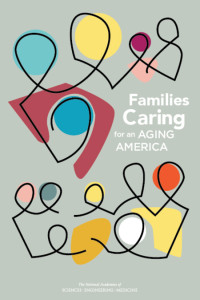 My book, Tangles and Plaques: A Mother and Daughter Face Alzheimer’s, will be out in February. I’ve been researching ideas for marketing, and I’m especially interested in speaking to groups who have a special interest in Alzheimer’s, like caregivers.
My book, Tangles and Plaques: A Mother and Daughter Face Alzheimer’s, will be out in February. I’ve been researching ideas for marketing, and I’m especially interested in speaking to groups who have a special interest in Alzheimer’s, like caregivers.
My husband, who is a physician, just sent me this link to a report called “Families Caring for an Aging America,” from the National Academies of Science, Engineering, and Medicine (from September 13). The report was written by Richard Schulz and Jill Eden, Editors; Committee on Family Caregiving for Older Adults; Board on Health Care Services; Health and Medicine Division; National Academies of Sciences, Engineering, and Medicine.
You can download a PDF of the full report here.
Here’s a summery of the report from the National Academies:
At least 17.7 million individuals in the United States are providing care and support to an older parent, spouse, friend, or neighbor who needs help because of a limitation in their physical, mental, or cognitive functioning. The circumstances of individual caregivers are extremely varied. They may live with, nearby, or far away from the person receiving care. The care they provide may be episodic, daily, occasional, or of short or long duration. The caregiver may help with household tasks or self-care activities, such as getting in and out of bed, bathing, dressing, eating, or toileting, or may provide complex medical care tasks, such as managing medications and giving injections. The older adult may have dementia and require a caregiver’s constant supervision. Or, the caregiver may be responsible for all of these activities. With support from 15 sponsors, the National Academies of Sciences, Engineering, and Medicine convened an expert committee to examine what is known about the nation’s family caregivers of older adults and to recommend policies to address their needs and help to minimize the barriers they encounter in acting on behalf of an older adult. The resulting report, Families Caring for an Aging America, provides an overview of the prevalence and nature of family caregiving of older adults as well as its personal impact on caregivers’ health, economic security, and overall well-being. The report also examines the available evidence on the effectiveness of programs and interventions designed to support family caregivers. It concludes with recommendations for developing a national strategy to effectively engage and support them.
On the one hand, it’s sad that we need a national strategy to support caregivers—which speaks to the fact that so many people are living longer and therefore need help, whether they have Alzheimer’s or other issues. On the other hand, I’m glad to see the National Academies focusing on developing the support so many caregivers need now, and will continue to need in the future.
In Appendix G of the report, “Caregiving Stories,” one daughter expresses frustration about issues similar to what I faced when Mom broke her hip:
I am so angry that my head might explode. At about 5:30, I was handed a bunch of papers by the head of the rehab department at the hospital where my mom has started physical therapy. We all thought this was a great idea. But apparently her Medigap policy denied this coverage. I have requested a ‘fast track’ appeal. She has already started the rehab work 2x a day. I hope they keep going with the treatment while this nightmare unfolds. I hate this.
And later, the same daughter deals with her mother’s risk of falling since she ignores the alarm on her bed and wheelchair (which I also went through with my mother):
Mom did well in physical therapy, on her second day. She walked up and down the hall with a walker, according to her roommate, a former home health aide herself. I have one question. She keeps getting up out of bed, even though her bed and wheelchair are alarmed. The alarms don’t phase her. It doesn’t seem to stick when she is told to stay in bed, or not to stand up…. The staff come in to help, but a momentary delay could produce another fall (god forbid) …
I’m so glad this report is coming out, and hope that it will be helpful to many people. My mother’s journey is over (she died in May) but millions of others can benefit, and I can’t help but wonder if I—and other caregivers—will be the on the receiving end of this care one day.